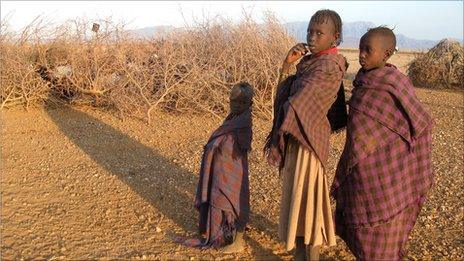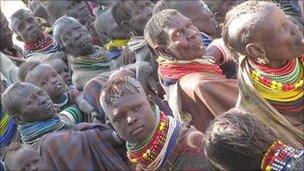Was the food crisis in Kenya avoidable?
- Published

Critics accuse the Kenyan government of being slow to respond to the crisis
Around 10% of all Kenyans now need food aid - and the number is rising. But was this crisis avoidable?
Etukoit Erupe has set up home on a sandy parched plain, where there is not a hint of vegetation as far as the eye can see.
As he returned with a herd of goats and sheep, his legs were clearly in pain after the two-hour walk from the pasture near a river.
"I have lost relatives in this drought - elderly relatives have died. We haven't had any proper rain here for three years," he told me, adding that this was the worst drought to hit the area for five years.
"There's hardly any grass anywhere so the livestock have been swept away - half my animals have died - 40 of them - it is the same story in every homestead."
'Melting like ice cream'
For the Turkana, losing the livestock is bit like someone hacking into your bank account and making off with your life savings. The animals are their primary source of food - milk, meat and blood - as well as their store of wealth.
At night, Mr Erupe's four children cooked maize porridge over a fire - the only meal of the day.
The food has to be carefully rationed in the hope that it will last until the next food distribution - a three-hour walk away.
But the current dry spell was long predicted so some feel the crisis could have been prevented.
"This is a governance drought. It is a situation caused by the failure of the government to plan," said John Githongo, a well known anti-corruption activist who heads the Inuka Kenya Trust campaign group.
"Drought is an act of God. Famine is an act of man. What we are going through - it's an act of men.
John Githongo, Inuka Kenya Trust: 'The government slept right through the warnings'
"The Turkana have been catastrophically let down. We have watched them melting in the sun like an ice cream for the last two years knowing this was coming," he said.
The drought has also led to an increase in cross-border armed conflict over resources amongst pastoralist communities. The latest clash on 5 August left 21 Turkana dead in Todonyang - an attack blamed on Ethiopian raiders.
Nearby, an elderly woman, Kamuran Akai, had built her simple domed shelter from branches. She held out her hand to show me the wild fruits that were keeping her going, staving off the hunger.
"For the last four years we have been depending on this food because of the drought," she said as she crushed a small yellowy-brown berry with a rock to make it more digestible.
Crops rotting
People here complain that the food handouts have been irregular and the quantities too small.
Much of the Turkana region is arid so these resourceful hardy pastoralist communities are used to periods without rain.
But climate change is a deadly reality here. Now the droughts are hitting more often - every two years - whereas in the past they struck once a decade, leaving people more time to build up their herds during the good years.
Over the past two weeks Kenyan people, rather than the government, have led the way in addressing the food crisis.

Many say the food handouts are insufficient
The "Kenyans for Kenya" appeal aimed to raise at least $5m (£3.1m) to enable the Kenya Red Cross to help victims of the drought.
There were generous corporate donations but masses of Kenyans donated whatever they could afford using mobile phone money transfers.
The Kenyan government has in the past made the right noises about increasing assistance to the most drought-prone areas of the country. In April 2008 it set up the Ministry of State for Development of Northern Kenya and other Arid Lands.
But as trucks of food donated by Kenyans are flagged off from Nairobi, the Anti-Corruption Commission has been asked by the government to find out where at least $4m disappeared to from the same ministry - money meant to help people manage during droughts and improve their livelihoods.
Meanwhile, in more fertile parts of Kenya, farmers complain that their crops are rotting because the roads are so bad they can't transport their produce to markets.
Critics point to this as another example of government failure turning the drought into a humanitarian disaster.
'Drought is big business'
The Kenyan government says it was aware of the impending drought in September last year but that it struck harder than expected. Government has silos containing just a quarter of what is supposed to be there for these emergencies - a short-fall blamed on high food prices.
The lack of trust in the government was one factor which persuaded people to contribute to the Kenyans for Kenya appeal.

The Kenyan government admits the drought struck harder than expected
"It's no use picking up the phone and calling the PM [Prime Minister Raila Odinga] or the president [Mwai Kibaki] - it's a waste of time," Mr Githongo told me, before turning to the issue of corruption.
"Drought is big business. Huge profits are going to be made off this drought. People get rich off drought as it means very rapid procurement, people can cut corners and favoured contractors can make a profit.
"It's a very cynical situation but that's the truth. It is really infuriating because it slows down the ability to mitigate this kind of situation even when it has arisen because everybody wants to cut a piece of the pie."
Mr Githongo says people raising money are trying to bypass the government "because they have no confidence the government will deliver to the people of Turkana."
Pastoralist lifestyle
In South Turkana, I did see some evidence that suggested some politicians were trying to make a difference.
In this arid land I was shocked to find a bright green 60-acre crop of maize. This was made possible by a government-aided irrigation scheme. The plan is to irrigate 10,000 acres of land near the Turkwel River.
"We have a lot of hope for Turkana because areas next to the Turkwel River are very fertile with a lot of water," said Daniel Waweru of the Kenyan government's National Irrigation Board.
"If we could open bigger areas to irrigation then we will see we don't need food aid in Turkana and across northern Kenya."
Pushed by the effects of climate change, there is an urgent need to switch from relying on the unreliable rain-fed agriculture to embrace irrigation systems.
The government has announced that some 10,000 acres will be irrigated over the next few years but the question is, will the food grown there remain in the Turkana region?
Another factor meaning that Turkana is likely to remain vulnerable to drought is that efforts to encourage people to switch from their nomadic lifestyle - relying on their livestock to survive - and become more settled farmers seem to be having little impact.
"Our pastoralist lifestyle will not change because it is what we are used to. The drought is severe and prolonged so the problem is we lose lives and our livestock.
"But we are not thinking of moving to centres and abandoning life with animals. We want to stay with our animals," Mr Erupe told me before setting off once again on the daily search for the dwindling pasture.